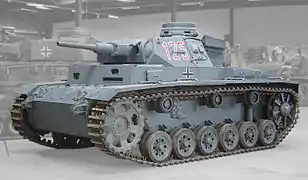5 cm KwK 38
The 5 cm KwK 38 L/42 (5 cm Kampfwagenkanone 38 L/42) was a German 50 mm calibre cannon used as the main armament of variants of the German Sd.Kfz. 141 Panzerkampfwagen III medium tank during the Second World War. There was no towed anti-tank gun equivalent.[1]
| 5 cm KwK 38 (L/42) | |
|---|---|
 PzKpfw III/H with 5 cm KwK 38 L/42 | |
| Type | Kampfwagenkanone |
| Place of origin | Germany |
| Service history | |
| Used by | |
| Wars | World War II |
| Production history | |
| Unit cost | 8000 Reichmark |
| Specifications | |
| Mass | 400 kg (881.8 lb) |
| Barrel length | 210 cm (83 in) bore (42 calibers) |
| Shell | Fixed ammunition 50 mm × 289 mm (2.0 in × 11.4 in) R |
| Shell weight | 2.07 kg (4.56 lb) armor-piercing (APC-HE) Pzgr. 39 |
| Caliber | 50 mm (1.97 in) |
| Elevation | -10° to +20° |
| Muzzle velocity | 685 m/s (2,250 ft/s) |
History
The Panzer III was intended to fight other tanks; in the initial design stage a 50-millimetre (1.97 in) gun was specified. However, the infantry at the time were being equipped with the 37-millimetre (1.46 in) PaK 36, and it was thought that, in the interest of standardization, the tanks should carry the same armament. As a compromise, the turret ring was made large enough to accommodate a 50-millimetre (1.97 in) gun should a future upgrade be required. This single decision later assured the Panzer III a prolonged life in the German Army.[2]
The early Panzer III Ausf. A to early Ausf. G were equipped with a 3.7 cm KwK 36 L/45, which proved adequate during the campaigns of 1939 and 1940.[3] In response to increasingly better armed and armored opponents, the later Panzer III Ausf. F to Ausf. J were upgraded with the 5 cm KwK 38 L/42.[4] And the later Panzer III Ausf. J¹ to M went with the longer 5 cm KwK 39 L/60 gun.[5]
Ammunition
Average penetration performance established against rolled homogenous steel armour plate laid back at 30° from the vertical.[6]
- PzGr (Armour Piercing)
- Weight of projectile: 2.06 kg (4.5 lb)
- Muzzle velocity: 685 m/s (2,250 ft/s)
| 100 m (330 ft) | 500 m (1,600 ft) | 1,000 m (3,300 ft) | 1,500 m (4,900 ft) |
|---|---|---|---|
| 53 mm (2.1 in) | 43 mm (1.7 in) | 32 mm (1.3 in) | 24 mm (0.94 in) |
- PzGr. 39 (Armour-piercing, capped, ballistic cap)
- Weight of projectile: 2.06 kg
- Muzzle velocity: 685 m/s
| 100 m | 500 m | 1000 m | 1500 m |
|---|---|---|---|
| 55 mm (2.2 in) | 47 mm (1.9 in) | 37 mm (1.5 in) | 28 mm (1.1 in) |
- PzGr. 40 (Armour-piercing, composite, rigid)
- Weight of projectile: 0.925 kg (2.04 lb)
- Muzzle velocity: 1,050 m/s (3,400 ft/s)
| 100 m | 500 m |
|---|---|
| 94 mm (3.7 in) | 55 mm |
| Ammunition type | Muzzle velocity | Penetration | |||||||||
|---|---|---|---|---|---|---|---|---|---|---|---|
| 100 m | 500 m | 1000 m | 1500 m | 2,000 m (6,600 ft) | |||||||
| Pzgr. 39 APCBC | 685 m/s | 76 mm (3.0 in) | 62 mm (2.4 in) | 48 mm (1.9 in) | 38 mm (1.5 in) | 29 mm (1.1 in) | |||||
| Pzgr. 40 APCR | 1,050 m/s | 107 mm (4.2 in) | 74 mm | 47 mm (1.9 in) | 30 mm (1.2 in) | 20 mm | |||||
Vehicles mounted on
See also
Weapons of comparable role, performance and era
- Ordnance QF 2-pounder: British 40mm tank and anti-tank gun
- 45 mm anti-tank gun M1932 (19-K): Soviet tank gun
- 37 mm gun M3: US tank gun
References
Citations
- Rottman, Gordon L. (2008). M3 Medium Tank Vs Panzer III: Kasserine Pass 1943. Duel 10. Osprey Publishing. p. 20. ISBN 978-1-84603-261-5.
- Perrett (1999), p. 4.
- Perrett (1999), p. 6.
- Perrett (1999), p. 7.
- Perrett (1999), p. 8.
- Ankerstjerne, Christian (13 August 2014). "5 cm Kw K". Panzerworld. Retrieved 24 May 2019.
- Bird, Lorrin Rexford; Livingston, Robert D. (2001). WWII Ballistics: Armor and Gunnery. Overmatch Press. p. 61.
- Jentz, Thomas; Doyle, Hilary (1995). Germany's Panther Tank. Schiffer Publishing, Ltd. pp. 11. ISBN 0887408125.
Bibliography
- Perrett, Bryan (1999). Panzerkampfwagen III: Medium Tank 1936–44. New Vanguard 27. Oxford, UK: Osprey Publishing. ISBN 1-85532-845-3.
